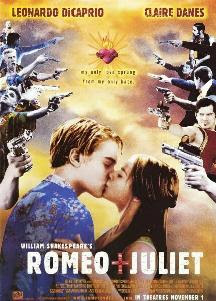Romeo + Juliet 1996
 The most recent film adaptation of Romeo and Juliet was the hyperkinetic, modernized version by Baz Luhrmann, which capitalized on Leonardo DiCaprio's heart-throb status and a contemporary music score. I liked some parts of it, but overall it leaves one with a feeling of incompleteness. It's really best for those who have never read a word of the Bard.
The most recent film adaptation of Romeo and Juliet was the hyperkinetic, modernized version by Baz Luhrmann, which capitalized on Leonardo DiCaprio's heart-throb status and a contemporary music score. I liked some parts of it, but overall it leaves one with a feeling of incompleteness. It's really best for those who have never read a word of the Bard.Set in Verona Beach, which looks to be in Southern California (but filmed in Mexico) Romeo + Juliet does capture the heat of the play, and Luhrmann and his co-screenwriters bend over backwards to update the material, sometimes ingeniously. The feuding Montagues and Capulets are competing tycoons, complete with armed guards and big limos. The rowdy young ones ride around in souped up convertibles, armed to the teeth (the guns are labeled with the brand name "Sword," to get around the pesky problem of the characters referring to them as such). Mercutio's Queen Mab speech is not about a fairy but a drug not unlike Ecstasy. And so on. Some of it's clever, some of it is groan-inducing. At some point one wonders why they just didn't do a complete update, and keep the plot but jettison the language, like they did in West Side Story.
There's also Luhrmann's visual tics, which ran amok during Moulin Rouge. He speeds up the film, makes swooping cuts, and threatens epileptics with seizures. This may go down with the MTV generation, but I think Shakespeare deserves a tad more reverence.
But there are things to like. DiCaprio and Claire Danes, as Juliet, more than hold their own. Luhrmann has hit upon a recurring theme of water to frame his star-crossed lovers, as they meet by gazing at each through a fish tank, and the balcony scene is performed while in a swimming pool. Harold Perrineau as Mercutio, John Leguizamo as Tybalt, are both fine, and Pete Postlethwaite as Friar Laurence is excellent. I had to laugh at how Luhrmann chose to have Laurence's letter to Romeo, which is crucial to the plot, delayed. In the text it is because the messenger is quarantined by an outbreak of pestilence. Here it is by a way-laid package by a Fedex type service. I suppose the next version will have email server problems.
The film cuts a lot of the text, a lot. Not so much in the first half, but the second leaves chunks out, including much of the dialogue in the tomb scene. It's a bit jarring for the cognoscenti, but makes sense for the intended audience.
If the future holds to the past, another version will roll around in about ten to twenty years (there was a 1954 version, apparently not available on DVD). It will be interesting to see what this future director decides to do with it, but even the most incompetent of filmmakers can't diminish the essence of why this story has been eternal for over four hundred years, and that is the language. As long as it is served, all will be well.


Comments
Post a Comment